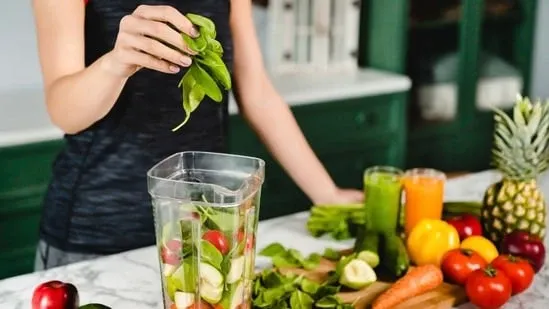Gynaecologist shares 9 tips to boost immunity in women during monsoon: ‘Add as many spices as possible to your meals’
admin | July 15, 2025 7:22 PM CST

Deadly infections, skin flare-ups, indigestion, and waterborne illnesses spike during the monsoon season. The increased humidity in the air creates the perfect environments for bacteria, fungi and viruses to breed faster, leading to monsoon illnesses.
Infections and gut problems in women are more common during this time.
In an interview with HT Lifestyle, Dr Vinoad Bharrati, director and consultant gynaecologist at Rising Medicare Hospital and Elite Momz, Pune said, "With a few mindful dietary choices and basic precautions, you can protect your health and enjoy the beauty of the rains without falling sick."
Dr. Vinoad Bharrati shared a few tips to boost immunity:
1. Cooked fresh, digested best
Heat destroys the majority of pathogens. Home-cooked meals are always safe and carry fewer risks of infections. Warm chicken broth or vegetable soup, light dals, khichdi, and steamed vegetables; they are easy to digest and include essential nutrients.
2. Boiled water
Boil your water for at least 10-15 minutes. Contaminated water is a leading cause of monsoon infections. You can also use reliable water purifiers. Always carry your water bottle when you are travelling. For kids, make sure their water bottles are filled with safe water from home.
3. Kitchen spices for strong immunity
In your daily meals, add as many spices as possible from your kitchen. Asofoetida, dry ginger, black pepper, cumin, and ginger are your soldiers to fight with indigestion caused during the monsoon. Lemon, mint, coriander and garlic should also be used generously. Allicin in garlic, particularly, has powerful antibacterial, antiviral, and antifungal properties. These help the body fight off common monsoon infections like colds, flu, and foodborne illnesses. Ayurveda recommends using a variety of spices during the monsoon, as they help rekindle the digestive fire and stimulate gut enzymes, supporting better digestion and overall health.
 4. Probiotics powerhouses
Yoghurt and buttermilk are your gut's best friends. They introduce beneficial bacteria to support healthy gut microbiota. Fresh home-made curd and buttermilk, which is at room temperature and not sour, should be used daily to improve beneficial bacterial colonies in the gut. This will help improve immunity and protect us from any gut issues like indigestion during the monsoon.
5. The right oil for the rainy days
High humidity, cooler temperatures during monsoon lead to a slower metabolism. During the rainy season, your body struggles to process heavy, greasy foods. So, opt for light oils that are easier on your gut and less likely to promote inflammation or sluggishness. Rice bran, sunflower and corn oil are the best oils for monsoon. These are light and easily digestible oils. Heavy and dense oils like mustard, sesame, and peanut oils should be avoided.
6. Bright foods for grey skies
Add a lot of colour to your plate with seasonal vegetables like carrots, beetroot, bottle gourd, and ridge gourd, along with antioxidant-rich fruits such as apples, pomegranates, and bananas. These vibrant foods help strengthen your immunity and keep you energised throughout the monsoon.
7. Clean, cooked and safe
During the monsoon, cleanliness is key, especially when it comes to vegetables. Always wash them thoroughly, preferably in warm water with a pinch of salt to eliminate dirt, pesticides, and microbes. To go a step further, steam or cook your vegetables well, as high temperatures help destroy any lingering bacteria or viruses, making your meals safer and easier to digest. Do not use green leafy vegetables in the monsoon as they carry more pathogens and increase the risk of illnesses.
8. Dals and beans
Monsoon weather calls for meals that are warm, light, and easy on the stomach. Well-cooked dals and legumes like moong dal, masoor dal, and split urad dal provide plant-based protein, iron, and fibre, which help support immunity and digestion. These protein-rich foods are especially important when appetite dips and the body's ability to absorb nutrients is compromised. Thin lentil soup or moong dal tempered with ghee, garlic and asafoetida and steamed rice is the best meal for monsoon. Snacks like pops of jowar, rice, and corn are easy to digest and perfect for evening snacks.
9. What to avoid
Avoid raw salads, pre-cut fruits from outside, seafood, unpasteurised or improperly stored dairy, mushrooms and leftovers.
4. Probiotics powerhouses
Yoghurt and buttermilk are your gut's best friends. They introduce beneficial bacteria to support healthy gut microbiota. Fresh home-made curd and buttermilk, which is at room temperature and not sour, should be used daily to improve beneficial bacterial colonies in the gut. This will help improve immunity and protect us from any gut issues like indigestion during the monsoon.
5. The right oil for the rainy days
High humidity, cooler temperatures during monsoon lead to a slower metabolism. During the rainy season, your body struggles to process heavy, greasy foods. So, opt for light oils that are easier on your gut and less likely to promote inflammation or sluggishness. Rice bran, sunflower and corn oil are the best oils for monsoon. These are light and easily digestible oils. Heavy and dense oils like mustard, sesame, and peanut oils should be avoided.
6. Bright foods for grey skies
Add a lot of colour to your plate with seasonal vegetables like carrots, beetroot, bottle gourd, and ridge gourd, along with antioxidant-rich fruits such as apples, pomegranates, and bananas. These vibrant foods help strengthen your immunity and keep you energised throughout the monsoon.
7. Clean, cooked and safe
During the monsoon, cleanliness is key, especially when it comes to vegetables. Always wash them thoroughly, preferably in warm water with a pinch of salt to eliminate dirt, pesticides, and microbes. To go a step further, steam or cook your vegetables well, as high temperatures help destroy any lingering bacteria or viruses, making your meals safer and easier to digest. Do not use green leafy vegetables in the monsoon as they carry more pathogens and increase the risk of illnesses.
8. Dals and beans
Monsoon weather calls for meals that are warm, light, and easy on the stomach. Well-cooked dals and legumes like moong dal, masoor dal, and split urad dal provide plant-based protein, iron, and fibre, which help support immunity and digestion. These protein-rich foods are especially important when appetite dips and the body's ability to absorb nutrients is compromised. Thin lentil soup or moong dal tempered with ghee, garlic and asafoetida and steamed rice is the best meal for monsoon. Snacks like pops of jowar, rice, and corn are easy to digest and perfect for evening snacks.
9. What to avoid
Avoid raw salads, pre-cut fruits from outside, seafood, unpasteurised or improperly stored dairy, mushrooms and leftovers.
 4. Probiotics powerhouses
Yoghurt and buttermilk are your gut's best friends. They introduce beneficial bacteria to support healthy gut microbiota. Fresh home-made curd and buttermilk, which is at room temperature and not sour, should be used daily to improve beneficial bacterial colonies in the gut. This will help improve immunity and protect us from any gut issues like indigestion during the monsoon.
5. The right oil for the rainy days
High humidity, cooler temperatures during monsoon lead to a slower metabolism. During the rainy season, your body struggles to process heavy, greasy foods. So, opt for light oils that are easier on your gut and less likely to promote inflammation or sluggishness. Rice bran, sunflower and corn oil are the best oils for monsoon. These are light and easily digestible oils. Heavy and dense oils like mustard, sesame, and peanut oils should be avoided.
6. Bright foods for grey skies
Add a lot of colour to your plate with seasonal vegetables like carrots, beetroot, bottle gourd, and ridge gourd, along with antioxidant-rich fruits such as apples, pomegranates, and bananas. These vibrant foods help strengthen your immunity and keep you energised throughout the monsoon.
7. Clean, cooked and safe
During the monsoon, cleanliness is key, especially when it comes to vegetables. Always wash them thoroughly, preferably in warm water with a pinch of salt to eliminate dirt, pesticides, and microbes. To go a step further, steam or cook your vegetables well, as high temperatures help destroy any lingering bacteria or viruses, making your meals safer and easier to digest. Do not use green leafy vegetables in the monsoon as they carry more pathogens and increase the risk of illnesses.
8. Dals and beans
Monsoon weather calls for meals that are warm, light, and easy on the stomach. Well-cooked dals and legumes like moong dal, masoor dal, and split urad dal provide plant-based protein, iron, and fibre, which help support immunity and digestion. These protein-rich foods are especially important when appetite dips and the body's ability to absorb nutrients is compromised. Thin lentil soup or moong dal tempered with ghee, garlic and asafoetida and steamed rice is the best meal for monsoon. Snacks like pops of jowar, rice, and corn are easy to digest and perfect for evening snacks.
9. What to avoid
Avoid raw salads, pre-cut fruits from outside, seafood, unpasteurised or improperly stored dairy, mushrooms and leftovers.
4. Probiotics powerhouses
Yoghurt and buttermilk are your gut's best friends. They introduce beneficial bacteria to support healthy gut microbiota. Fresh home-made curd and buttermilk, which is at room temperature and not sour, should be used daily to improve beneficial bacterial colonies in the gut. This will help improve immunity and protect us from any gut issues like indigestion during the monsoon.
5. The right oil for the rainy days
High humidity, cooler temperatures during monsoon lead to a slower metabolism. During the rainy season, your body struggles to process heavy, greasy foods. So, opt for light oils that are easier on your gut and less likely to promote inflammation or sluggishness. Rice bran, sunflower and corn oil are the best oils for monsoon. These are light and easily digestible oils. Heavy and dense oils like mustard, sesame, and peanut oils should be avoided.
6. Bright foods for grey skies
Add a lot of colour to your plate with seasonal vegetables like carrots, beetroot, bottle gourd, and ridge gourd, along with antioxidant-rich fruits such as apples, pomegranates, and bananas. These vibrant foods help strengthen your immunity and keep you energised throughout the monsoon.
7. Clean, cooked and safe
During the monsoon, cleanliness is key, especially when it comes to vegetables. Always wash them thoroughly, preferably in warm water with a pinch of salt to eliminate dirt, pesticides, and microbes. To go a step further, steam or cook your vegetables well, as high temperatures help destroy any lingering bacteria or viruses, making your meals safer and easier to digest. Do not use green leafy vegetables in the monsoon as they carry more pathogens and increase the risk of illnesses.
8. Dals and beans
Monsoon weather calls for meals that are warm, light, and easy on the stomach. Well-cooked dals and legumes like moong dal, masoor dal, and split urad dal provide plant-based protein, iron, and fibre, which help support immunity and digestion. These protein-rich foods are especially important when appetite dips and the body's ability to absorb nutrients is compromised. Thin lentil soup or moong dal tempered with ghee, garlic and asafoetida and steamed rice is the best meal for monsoon. Snacks like pops of jowar, rice, and corn are easy to digest and perfect for evening snacks.
9. What to avoid
Avoid raw salads, pre-cut fruits from outside, seafood, unpasteurised or improperly stored dairy, mushrooms and leftovers.
READ NEXT
-
Does every Muslim child have to get circumcised after birth? Truth tangled between religion, science and law

-
Does every Muslim child have to get circumcised after birth? Truth tangled between religion, science and law

-
Decorate hands with these henna designs in the month of Sawan, you will look very beautiful

-
Realme GT 7 Price in India with Bajaj Finserv EMI Plans and Launch Offers

-
Cal Raleigh Joins Team USA for 2026 World Baseball Classic
